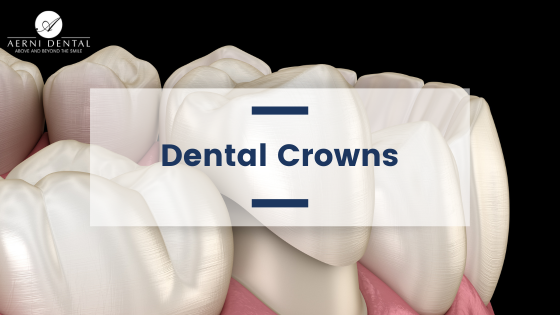A crown, sometimes referred to as a “cap,” is a complete covering for a tooth that is used to restore functionality to a tooth that has suffered damage.
When is a crown needed?
Crowns are one of many options available for restoring teeth and may be an option when bonding or other more conservative treatments are not an option. This includes cases where a tooth has extensive tooth decay, a crack that threatens the structural integrity of the tooth, or after root canal therapy has been performed.
Crowns cover the entirety of the exposed portion of the tooth. They are made from porcelain and fashioned to look just like the top of a natural tooth.
What does getting a crown involve?
Traditional porcelain crowns may take more than one visit to complete. Dr. Aerni will first prepare the tooth in question to be able to receive a crown. After this, an impression of the tooth will be made, allowing the creation of a crown that will be a perfect match for your tooth.
This impression will be sent to a dental lab where the crown will be created in a shade that will match well with your other teeth. While waiting for the crown to be created, you will be fitted with a temporary restoration to protect your tooth until your next visit, at which point your final crown will be bonded into place.
As an alternative to traditional crowns, Aerni Dental also offers same-day CEREC crowns, which are manufactured in our office rather than in a dental lab.
How do I care for my crown?
The lifespan of your crown can depend on how well you take care of it. Remember: the crown is still protecting a living tooth that needs the same care as the rest of your teeth. Be sure to continue to brush twice a day and floss in order to eliminate plaque from the area where the crown meets your gums and prevent gum disease.
It’s best to avoid biting into hard food or other objects which might damage your crown (such as fingernails). Let Dr. Aerni know if you have a habit of grinding your teeth, as this should be addressed to help protect, not only your crown, but all of your teeth from damage.
Dental Crowns FAQ
General / Basics
What are dental crowns?
A dental crown is a custom-made cap that covers and protects a damaged or weakened tooth. Crowns restore the tooth’s strength, function, and appearance, making them a common solution for teeth that can’t be repaired with fillings alone.
Why would someone need a dental crown?
Crowns are recommended when a tooth is cracked, worn down, weakened after a root canal, or has a cavity too large for a filling. They can also improve the appearance of discolored or misshapen teeth.
How do dental crowns work?
A crown fits securely over the prepared natural tooth or dental implant. Once bonded in place, it acts like the tooth’s outer shell, allowing you to chew, smile, and speak normally.
Candidacy
Who is a good candidate for a dental crown?
Most adults with damaged, decayed, or cosmetically compromised teeth are good candidates. Crowns are also used to support dental bridges or restore dental implants.
Are there age restrictions for dental crowns?
Crowns are generally placed on fully developed adult teeth. In children, stainless steel crowns are sometimes used for severely decayed baby teeth to preserve function until the permanent tooth erupts.
Who should avoid dental crowns?
Patients with poor gum health, untreated cavities, or severe bone loss may need additional treatment before crowns can be placed.
Procedure / Experience
What happens during a dental crown appointment?
Your dentist reshapes the tooth, takes an impression (digital or physical), and places a temporary crown. A dental lab or in-office milling system then creates your permanent crown, which is cemented in place at a follow-up visit.
How long does the procedure take?
Traditional crowns require two visits: one for preparation and impressions, and another for placement (usually 1–2 weeks later). Same-day crowns made with CEREC® or similar technology can be completed in a single appointment.
Does getting a crown hurt?
The procedure is done under local anesthesia, so you shouldn’t feel pain. Mild soreness or sensitivity is common afterward but usually subsides within a few days.
Will I need anesthesia or numbing?
Yes, the tooth and surrounding area are numbed to keep you comfortable throughout the preparation process.
Results
How long do dental crowns last?
With proper care, crowns typically last 10–15 years, though many last much longer. The lifespan depends on the material used and your oral habits.
Will my crown look or feel natural?
Yes. Modern crowns are designed to match the shape, size, and color of your natural teeth. Once placed, most patients forget they even have one.
Will other people notice I’ve had a crown?
Porcelain and ceramic crowns blend seamlessly with your smile, so it’s unlikely anyone will notice.
Recovery / Aftercare
What is the recovery time after getting a dental crown?
Most people return to normal activities the same day. Some temporary sensitivity to hot or cold foods may occur but usually resolves quickly.
Are there restrictions after the procedure?
If you have a temporary crown, you should avoid sticky or hard foods until your permanent crown is placed. After the permanent crown, you can eat normally.
What kind of care or maintenance is required?
Brush and floss as you would with natural teeth. Routine dental checkups and cleanings help extend the life of your crown.
Safety / Risks
Are dental crowns safe?
Yes. Crowns are a widely used and safe treatment. Your dentist will select biocompatible materials suited to your needs.
What are the potential risks or side effects?
Possible issues include temporary tooth sensitivity, gum irritation, or (rarely) loosening or chipping of the crown.
How does Dr. Aerni minimize risks during crown placement?
Dr. Aerni carefully assess your bite, tooth structure, and gum health before placement, and they ensure the crown fits precisely to avoid complications.
Alternatives & Comparisons
What are the alternatives to dental crowns?
Alternatives may include dental fillings, inlays/onlays, or veneers—though these are only suitable if less tooth structure is compromised.
How do crowns compare to fillings?
Fillings repair smaller cavities, while crowns cover and protect teeth with more extensive damage. A crown is often recommended when a filling would leave the tooth weak or prone to fracture.
How do crowns compare to veneers?
Veneers only cover the front surface of teeth for cosmetic improvement, while crowns provide full coverage for both strength and aesthetics.
Lifestyle Impact
Will my crown stain, chip, or wear down over time?
Porcelain and zirconia crowns resist staining better than natural enamel. While durable, they can chip or wear if you grind your teeth or chew on hard objects.
Can I eat and drink normally with a crown?
Yes. Once your permanent crown is in place, you can enjoy your favorite foods. Just avoid habits like chewing ice, which can damage any tooth or crown.
Do crowns require special dental products?
No special products are necessary. Standard fluoride toothpaste and floss are sufficient, although some patients prefer floss threaders or water flossers to clean around the crown’s edges.


